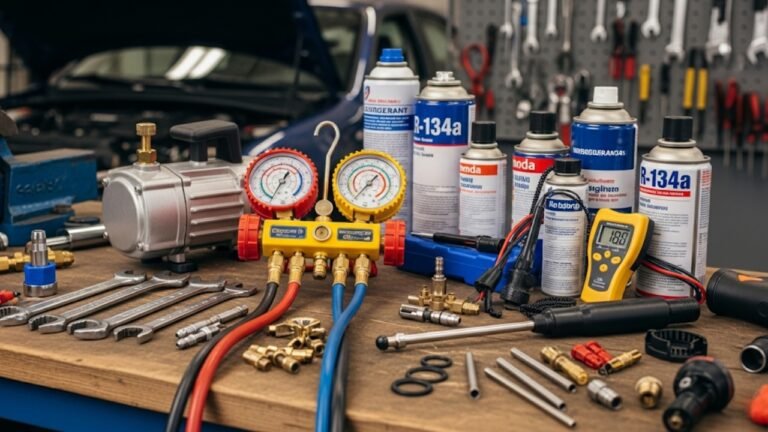What Are the Career Options for Automotive Body Repairers?
What Are the Career Options for Automotive Body Repairers? automotive body repair is an essential field that seeks to ensure public safety and functional aesthetics. With technological progress, new ways of doing things become available to the repairer so that various career pathways are open before them.
Whether you are just starting out in the field or looking for new opportunities, knowing the different career options can help guide your professional development.
To Recognize an Automotive Body Repairer’s Responsibility
Automotive body repairers are responsible for fixing cars that have been damaged through accidents, collisions, or everyday wear. They repair or replace body panels, repair dents, respray vehicles, and replace the whole vehicle now in the same way it came from the factory. This work takes a thorough knowledge of materials, tools, and repair techniques used on motor cars; it also requires adapting to new technologies as they emerge in the automotive trade.
Automotive body repair offers a hands-on trade and longer-term career prospects for anyone who wants to enter this industry. Let’s examine the career pathways available.
Traditional Career Pathways
- Apprenticeships
An apprenticeship is one of the most common entry points into the automotive body repair industry. Future workers will be right under the panel beater’s nose to learn hands-on skills and techniques. While working as an apprentice, they are taught key skills such as panel beating, spray painting, welding, and frame repairs. A mixture of theory and practice gives solid groundwork in automotive repair techniques.
An apprenticeship can last three to four years, depending on the program and the country. Upon completion, an apprentice becomes a qualified automotive body repairer or panel beater. Furthermore, one can concentrate on specific repair areas and specialize in them.
- Automotive Body Repair Technician
After completing apprenticeships or gaining formal education in automotive repair, many technicians go on to become automotive body repair specialists. In this position, their work as mechanics “broadens.” How much do these craftsmen do? They deal in more than the average mechanic’s fare. They are required to do a myriad of things, from replacing broken or crashed vehicle metal panels to carrying out major structural repairs on vehicles involved in accidents.
These craftsmen carry out a range of tasks using various tools and machines, such as welding machines, spray guns, and frame straightening machines. Over time, many repairs specialize in a particular job, like all-end sports car restoration or eco-friendly Electric vehicle body repairs.
- Collision Repair Specialist
Another route is specialized collision repair technicians. As its name suggests, this job focuses on repairing vehicles that have been involved in accidents. Collision repair technicians perform quick and efficient appraisals and get to work. Working with special dum-laden chisels and hammers, they reshape body panels and intimately Welded together auto frames to restore stiffness as if they were brand new again (as used by most). The job also involves fitting replacement parts damaged beyond repair and ensuring the vehicle meets modern safety regulations.
Specialization Opportunities:
As automotive body repairers accumulate more experience, they may specialize in specific aspects to enhance their earning potential through higher-level jobs.
Paint Technician
Auto painting is one of the most common areas within the automotive body repair field for specialization. Paint technicians require knowledge of finishes and an excellent eye for color matching and surface preparation. They work primarily on high-end cars and restorations where precision is paramount; they are respray artists in truth. Paint technicians often work in high-end vehicle repair shops and restoration businesses.
Frame Alignment Specialist
Specializing in this area, repairers restore the vehicle’s structural integrity following an accident. A frame alignment technician uses specialized equipment, such as computerized measurement systems and hydraulic jacks, to straighten and align the vehicle’s frame. This is a highly skilled role that often requires further training or expertise.
Dent Repair Specialist
Dent repair specialists repair minor to moderate dents and dings in automotive body panels, using special tools and skills to remove the damage without replacing expensive body sheets. This can be a particularly lucrative post if the person becomes skilled at paintless dent repair (PDR), which involves massaging the metal back into shape without harming the paint.
Continuing Your Career Journey:
After working as an automotive body repairer for several years, professionals may advance to positions with greater authority or financial potential. Here are some career development options:
- Shop Manager/Owner
Experienced automotive body repairers may wish to move into management or business ownership. Becoming a shop manager or owner means that professionals can administer workforces and on-site operations and maintain relationships with customers and suppliers. Business skills and technical expertise are necessary to thrive in these positions.
Successfully operating a shop means being savvy with budgeting, marketing, customer service, parts inventory, and the technical aspects of vehicle repair. Starting their repair shop could also be rewarding for those with entrepreneurial aspirations.
- Estimator/Claims Adjuster
In addition, repairers might become estimators or claims adjusters, for whom they would analyze vehicle damages, write appraisals, and evaluate repair costs. Many automotive body repairers have moved into this line of work from ‘hands-on’ repair, with their Estimators typically working closely with insurance company appraisers to agree on repair costs and decide what should be done with a vehicle.
Becoming an estimator often means extra training for employees specializing in estimating software and a firm understanding of how insurance companies operate, but this represents a use of strengths from within its midst on the part of the industry, which is now plainly profitable, too.
- Trainer or Educator
As long-time professionals continue in the industry, they can pass on their knowledge to the next generation of automotive body repairers. Some may opt instead for a slot teaching at vocational-technical colleges and training schools. In this way, those directly involved with repair have personally been able to pass on their valuable expertise and shape what lies ahead for all automotive body repairers tomorrow.
Emerging Technologies and New Opportunities.
The auto industry is undergoing huge change, stirred by the increase in electric vehicles (EVs), hybrids, and self-driving cars. This is creating new opportunities for car repairs that can embrace technology and change.
A is an Electric Vehicle Repair Specialist.
With the growing popularity of electric vehicles, there is also an increasing demand for specialists qualified to work on these cars. EV repair specialists know precisely what components of an electric vehicle must be looked after: the battery systems, motor housing, and advanced safety measures. (This emergence of electric cars means the trade has to be up with new technology. With repairs today if they are to offer you the best service tomorrow.)
-
Maintenance technician for Advanced Driver Assistance Systems (ADAS)
As a whole, ADAS refers to a range of electronic systems designed to help drivers drive safely and comfortably. These features include Lane-keeping assist, automatic braking, and adaptive cruise control. Automotive body repairers who have a grasp of ADAS can be called in for important calibration and repair work after an accident. This is a highly specialized field of growing importance that demands both technical knowledge and an understanding of modern vehicle electronics.
6 Conclusion: Finding Your Path
For automotive body repairers, the job and development path is multiple, rewarding, and full of opportunities for those who have the correct abilities and passion for their work. In the automotive body repair field, whether you choose to become a general repair technician or concentrate exclusively on one type of work, or even if your path takes you into business leadership roles, there is ample opportunity for professional development.
Through continual learning and adapting to new technologies, automotive body repairers can remain in demand in a dynamic market. Whether you are just starting your career or want to move into another role, the automotive repair field has a bright future for those with skill and knowledge.






